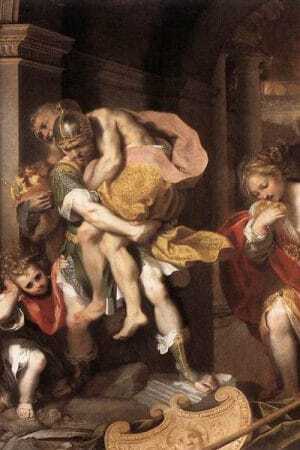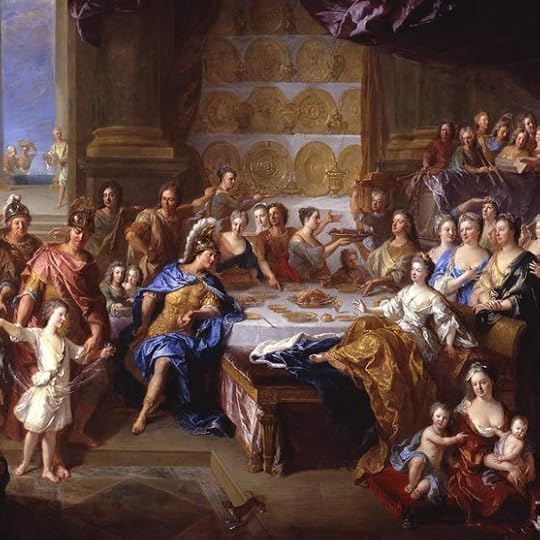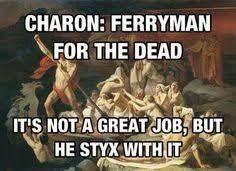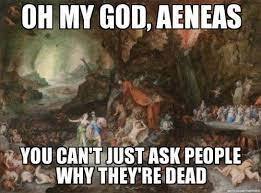Catching up on Classics (and lots more!) discussion

This topic is about
The Aeneid
Old School Classics, Pre-1915
>
The Aeneid - Spoilers
date newest »
newest »
 newest »
newest »
 I have just completed Book 1 which is split into two parts.. The story begins with the Trojans led by Aeneas start their seven year journey from Troy to Italy and Juno[Hera] attempts to impede the journey,setting it off course, because of her hatred of Trojans. Aeolus, the god of the wind, aids the group ans Aeneas lands in North Africa
I have just completed Book 1 which is split into two parts.. The story begins with the Trojans led by Aeneas start their seven year journey from Troy to Italy and Juno[Hera] attempts to impede the journey,setting it off course, because of her hatred of Trojans. Aeolus, the god of the wind, aids the group ans Aeneas lands in North AfricaThe scene then switches to Mount Olympus where Aeneas's mother Venus[Aphrodite] begs Jupiter[Zeus] to aid her son and he promises that he will survive and begin a new age.
Aeneas is diverted to Carthage by his mother where he meets the remainder of his crew and falls in love with Dido but when he leaves her she commitssuicide.
I think ,so far, that the Aeneid incoroorates two perspectives - the personal vision of Aeneas from his own point of view and his patriotic vision enveloping both human and divine events.
It seems to me that these views run in a similar vein [ in Book 1] to the first book of Homer's Odyssey albeit Virgil's his portrayal of Aeneas's final aim is different
Book 1 is mainly perceived as an introduction but highlights personal aims and how these mayhave to be tempered by worship and direction of the gods.
 I also finished book 1, it's great so far.
I also finished book 1, it's great so far.Some art depicting events of book 1:
Aeneas Fleeing Troy by Barocci Federico:

Meeting of Dido and Aeneas:

The Feast Of Dido and Aeneas:

 Thank you for tracking down those paintings, Jakub!
Thank you for tracking down those paintings, Jakub!I read the first few pages of 4 translations, and settled on the translation by David Ferry. I just finished Book 1 (of 12). So far, it does have a very similar feeling to reading Homer, which is no bad thing.
I found it funny when Jupiter told Venus that the Romans would have dominion without end -- not unexpected from a Roman writer, I suppose.
The thing I'm finding hardest so far is that so many of the characters have multiple names, so I'm having to work at keeping things straight. Of course this is partly my fault for being insufficiently familiar with Roman mythology. I'm much more familiar with the Greek names for the gods. So, Zeus is Jupiter, but sometimes Jove. Aphrodite is Venus, but also "the Cytherean". Ascanius is also Iulus. And so on.
Here is my favourite line so far:
These are the tears of things for what they were,
And what has become of them; the story of
The mortality of men strikes to the heart.
 Book V was really enjoyable, it was centered around sporting event which seemed like a pause between one adventure and another.
Book V was really enjoyable, it was centered around sporting event which seemed like a pause between one adventure and another.Running event was pretty fun, among other competitors there were two pals, Nisus and Euryalus. Nisus is on the lead but slips on blood and mud, so he decided to trip Salius, which was second at the time, to let his friend Euryalus win.
Now, spent, the goal they almost reach at last,
When eager Nisus, hapless in his haste,
Slipp'd first, and, slipping, fell upon the plain,
Soak'd with the blood of oxen newly slain.
The careless victor had not mark'd his way;
But, treading where the treach'rous puddle lay,
His heels flew up; and on the grassy floor
He fell, besmear'd with filth and holy gore.
Not mindless then, Euryalus, of thee,
Nor of the sacred bonds of amity,
He strove th’ immediate rival’s hope to cross,
And caught the foot of Salius as he rose.
So Salius lay extended on the plain;
Euryalus springs out, the prize to gain,
And leaves the crowd: applauding peals attend
The victor to the goal, who vanquish'd by his friend.
Next Helymus; and then Diores came,
By two misfortunes made the third in fame.
 Jakub wrote: "Book V was really enjoyable, it was centered around sporting event which seemed like a pause between one adventure and another.
Jakub wrote: "Book V was really enjoyable, it was centered around sporting event which seemed like a pause between one adventure and another.Running event was pretty fun, among other competitors there were two..."
Great quote Jakub! This epic is 80% action and I think that is one reason it can seem tiring, but I enjoyed it morethis time around. I was moved by the Dido-Aeneas story for the first time and found the psychological aspects of it quite interesting. A problem for us today is that the epic is expostulating values that were considered praiseworthy to the Roman and those are not values we might agree with. If anyone is wanting more background on that theme in the book I recommend the Great Courses lectures The Aeneid of Virgil Elizabeth Vandiver.
 I'm about halfway through Book V with the sporting events. I'm reading the Oxford World Classics edition, translated by Frederick Ahl, a professor at Cornell. He opts for a very straightforward translation which is not as poetic as others. I like all the footnotes in this edition which explain many points and nuances that otherwise might have gone over my head. For example, he points out a lot of wordplay that Virgil uses that doesn't directly translate to English. An easy example is that ROMA backwards spells AMOR (love). I'm enjoying this so far, but if I ever revisit it I think I'll try one of the more lyrical translations, maybe on audio.
I'm about halfway through Book V with the sporting events. I'm reading the Oxford World Classics edition, translated by Frederick Ahl, a professor at Cornell. He opts for a very straightforward translation which is not as poetic as others. I like all the footnotes in this edition which explain many points and nuances that otherwise might have gone over my head. For example, he points out a lot of wordplay that Virgil uses that doesn't directly translate to English. An easy example is that ROMA backwards spells AMOR (love). I'm enjoying this so far, but if I ever revisit it I think I'll try one of the more lyrical translations, maybe on audio.
 Wobbley wrote: "The thing I'm finding hardest so far is that so many of the characters have multiple names, so I'm having to work at keeping things straight. Of course this is partly my fault for being insufficiently familiar with Roman mythology"
Wobbley wrote: "The thing I'm finding hardest so far is that so many of the characters have multiple names, so I'm having to work at keeping things straight. Of course this is partly my fault for being insufficiently familiar with Roman mythology"The multiple names caused me some work too, especially with the many, many different names for the same tribes of people and the different ways of referring to specific people with special appelations of various sorts.
It varies depending on translation though. There was a lot of that in Fages and Fitzgerald, but Heaney's translation of book 6 seemed to smooth some of that out.
 I've just finished Book 4. Wow, their gods really determine everything in their lives; the people (even those in power) basically have no free will. You know, I'm starting to feel like all of Greek and Roman mythology is just a cautionary tale, against having gods who take a real interest in people, and who are too responsive to prayer. It's just different gods working against each other to reward or punish different people who have competing wants and needs. And in the end, everyone loses.
I've just finished Book 4. Wow, their gods really determine everything in their lives; the people (even those in power) basically have no free will. You know, I'm starting to feel like all of Greek and Roman mythology is just a cautionary tale, against having gods who take a real interest in people, and who are too responsive to prayer. It's just different gods working against each other to reward or punish different people who have competing wants and needs. And in the end, everyone loses. What do you think? Too cynical?
 Wobbley wrote: "...What do you think? Too cynical?"
Wobbley wrote: "...What do you think? Too cynical?"Sounds about right to me.
I finished Book 6 and have to take a break for a little bit. There were so many references to historical figures and events during the trip to the underworld that I spent more time reading the footnotes than I did reading the text itself. I'll jump back in later this week, and I might read the Introduction and Translator's Notes before I get back to the story - usually I read the Introduction last to avoid spoilers, but I've decided that probably won't be a big problem with this book.
 Or here's an alternative interpretation (also cynical, I'm afraid): that rather than a story (either for entertainment or as part of their religion), this was meant to be a reflection of life as it is, or a recent history. In which case, the role of the gods seems to be to act as a scapegoat. "What, you think we Trojans were kind of dumb to not consider that the horse might be a trap? It's not our fault -- the gods blinded us to that possibility." "You're mad at us for burning your boats even though we're on the same side? It was totally Juno who made us do that..."
Or here's an alternative interpretation (also cynical, I'm afraid): that rather than a story (either for entertainment or as part of their religion), this was meant to be a reflection of life as it is, or a recent history. In which case, the role of the gods seems to be to act as a scapegoat. "What, you think we Trojans were kind of dumb to not consider that the horse might be a trap? It's not our fault -- the gods blinded us to that possibility." "You're mad at us for burning your boats even though we're on the same side? It was totally Juno who made us do that..."
 Wobbley wrote: "Or here's an alternative interpretation (also cynical, I'm afraid): that rather than a story (either for entertainment or as part of their religion), this was meant to be a reflection of life as it..."
Wobbley wrote: "Or here's an alternative interpretation (also cynical, I'm afraid): that rather than a story (either for entertainment or as part of their religion), this was meant to be a reflection of life as it..."So funny about your last line. I was thinking about that as I read it. I can just see one of the wives trying to explain their actions: "no really, the GODS made us do it!"
I wonder how much their children got away with by blaming the Gods? "Mom, the Gods wanted me to take some extra cookies!"
 I'm in the middle of Book 10 of 12. I know this is probably a flaw with me as a reader, but I confess: I'm starting to feel worn down by this book. All the long descriptions of battles. All the long lists of people who came to them and how many boats and soldiers they brought, what weapons they were carrying, and whose bodies those weapons were taken from. I feel that the people in the target audience (presumably Romans) think very differently than the way that I think, and have very different interests...
I'm in the middle of Book 10 of 12. I know this is probably a flaw with me as a reader, but I confess: I'm starting to feel worn down by this book. All the long descriptions of battles. All the long lists of people who came to them and how many boats and soldiers they brought, what weapons they were carrying, and whose bodies those weapons were taken from. I feel that the people in the target audience (presumably Romans) think very differently than the way that I think, and have very different interests...
 Next chapters were even harder to understand than book 6. There was just so many names of Latin general and cities. I guess contemporary readers knew all those names, so i won't blame Virgil here and he gets a pass.
Next chapters were even harder to understand than book 6. There was just so many names of Latin general and cities. I guess contemporary readers knew all those names, so i won't blame Virgil here and he gets a pass.
 just read book6 the Kingdom Of The Dead, which was highly entertaining (if a bit "all over the place") and clearly a precursor to Dante's Inferno
just read book6 the Kingdom Of The Dead, which was highly entertaining (if a bit "all over the place") and clearly a precursor to Dante's Infernomy Fagles edition has a comprehensive glossary of all gods/men/places (inc pronounciation!) which I'm finding useful :oD
 Wobbley wrote: "I'm in the middle of Book 10 of 12. I know this is probably a flaw with me as a reader, but I confess: I'm starting to feel worn down by this book...."
Wobbley wrote: "I'm in the middle of Book 10 of 12. I know this is probably a flaw with me as a reader, but I confess: I'm starting to feel worn down by this book...."Yeah, I had to take a little break after Book 6. I'll be back at it this weekend, although I might slow the pace a little. Finishing by the end of the month does not appear likely.
 RJ - Slayer of Trolls wrote: "Yeah, I had to take a little break after Book 6. I'll be back at it this weekend, although I might slow the pace a little. Finishing by the end of the month does not appear likely."
RJ - Slayer of Trolls wrote: "Yeah, I had to take a little break after Book 6. I'll be back at it this weekend, although I might slow the pace a little. Finishing by the end of the month does not appear likely."This is totally understandable. I haven't decided if I'll take a break too, or if I'll try to push through to the end, since I'm so close.
 In the end, I did push through and finish this today. It goes on in much the same vein.
In the end, I did push through and finish this today. It goes on in much the same vein.Overall, this did have its moments -- the trip to the Underworld was probably my favourite part. But for me this is more a book for scholarly study than one I can read for pleasure. Perhaps I'm too far removed from the culture it was written for.
 Wobbley wrote: "In the end, I did push through and finish this today. It goes on in much the same vein...."
Wobbley wrote: "In the end, I did push through and finish this today. It goes on in much the same vein...."Congrats! I'm back at it today, starting with Book 7. I thought reading the Introduction might help, but reading someone's summary of the book was harder than reading the book itself. And I am enjoying the book OK, it's just the references and footnotes can bog things down. I'll take my time on the second half so I don't burn myself out, but I probably won't finish by the end of the month.
Books mentioned in this topic
The Aeneid of Virgil (other topics)The Aeneid (other topics)






This is a spoiler thread